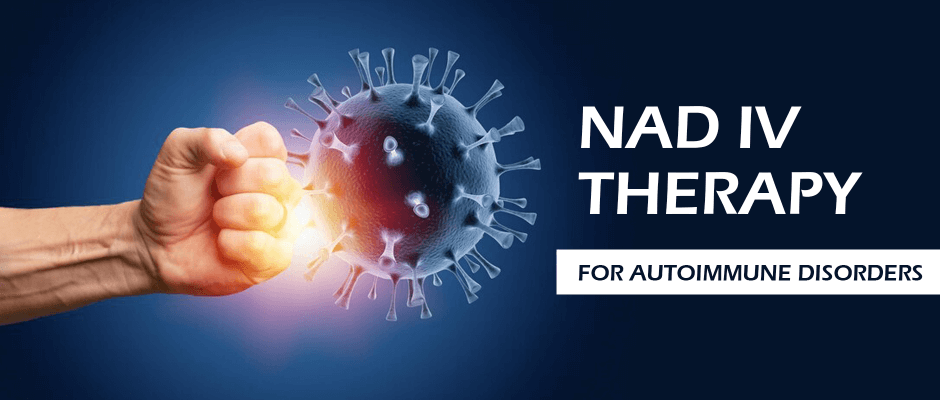
You can think of your immune cells as highly trained security specialists, constantly on the lookout for breaches that threaten your health. When they run across an intruder, their mission is crystal clear – identify and annihilate. But once in a blue moon something goes wrong, and your immune cells attack healthy tissues, creating autoimmune disorders. Scientists have identified over 80 subcategories of autoimmune disease, each with unique symptoms and affecting different tissues, organs and systems.
Learn about autoimmune disease, its mechanisms of action, and how adenine nicotinamide adenine dinucleotide (NAD), a powerful antioxidant nutrient, can help mitigate autoimmune symptoms and get your immune cells back on track.
What Exactly is Autoimmune Disease?
Autoimmune disease arises when your immune system malfunctions, mistaking your body’s healthy cells for antigens – toxic or foreign substances that pose a threat to your health. Multiple factors, both genetic and epigenetic, can trigger autoimmunity. While autoimmune disease can affect anyone, the condition is more prevalent among women, who account for up to 80% of sufferers.

Autoimmune disease is an umbrella term for a broad range of conditions that involve an autoreactive response on the part of rogue B and/or T immune cells. Conditions can range from subtle abnormalities that are scarcely noticeable to life-threatening organ failure. Autoimmune diseases can be organ-specific or generalized, posing a challenge to clinicians tasked with diagnosing and treating autoimmune disorders.
Why Autoimmune Disease Affects Women More than Men
Recent research implicates the double-X chromosome profile of female cells as the primary driver behind autoimmune disease, compared to males with only a single X chromosome. The X chromosomes in both males and females hold hundreds of active protein-specific genes that govern a plethora of human biologic processes.
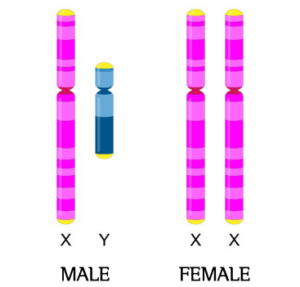
To avoid massive overproduction of proteins in women that could potentially be lethal, the female body has a unique mechanism for shutting down protein production in one of the XX pair. Inactivation of an X chromosome occurs in the developing female fetus via a molecule called Xist, a type of noncoding RNA present in every cell of the female body The gene for Xist is present in all X chromosomes, but Xist is only activated when there is a matched pair of X chromosomes, and it only acts on one of the pair.
Xist is made up of RNA, best known as a messenger substance, but there are many different kinds of RNA. Xist is a particularly long type of noncoding RNA that coats one of a female’s two X chromosomes, dramatically reducing its ability to produce excess proteins. However, sometimes Xist generates certain proteins that bind to it, and then more proteins bind to those proteins, potentially triggering an autoimmune response.
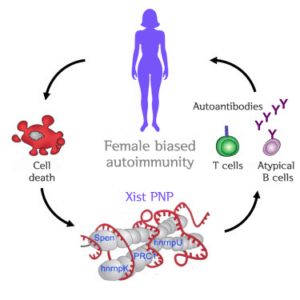
Types and Symptoms of Autoimmune Disorders
While autoimmune disease covers a broad range of conditions, certain autoimmune disorders are more prevalent than others.
Common autoimmune diseases include:
- Rheumatoid arthritis that attacks the joints
- Psoriasis, a skin condition marked by thick scaly itchy patches
- Psoriatic arthritis, a type of arthritis that affects people with psoriasis
- Lupus, a chronic autoimmune disease that attacks multiple parts of the body, including joints, skin and organs
- Thyroid diseases, including Graves’ disease, where the body makes too much thyroid hormone (hyperthyroidism)
- Hashimoto’s thyroiditis, where not enough thyroid hormone is produced (hypothyroidism)
- Multiple sclerosis (MS), where the myelin sheath surrounding nerve cells is damaged
- Inflammatory bowel disease, including Crohn’s disease and ulcerative colitis
- Celiac disease, where eating gluten causes inflammation of the GI tract
- Addison’s disease that affects the adrenal glands
- Type 1 diabetes, where insulin-producing cells in the pancreas are damaged by an autoimmune response
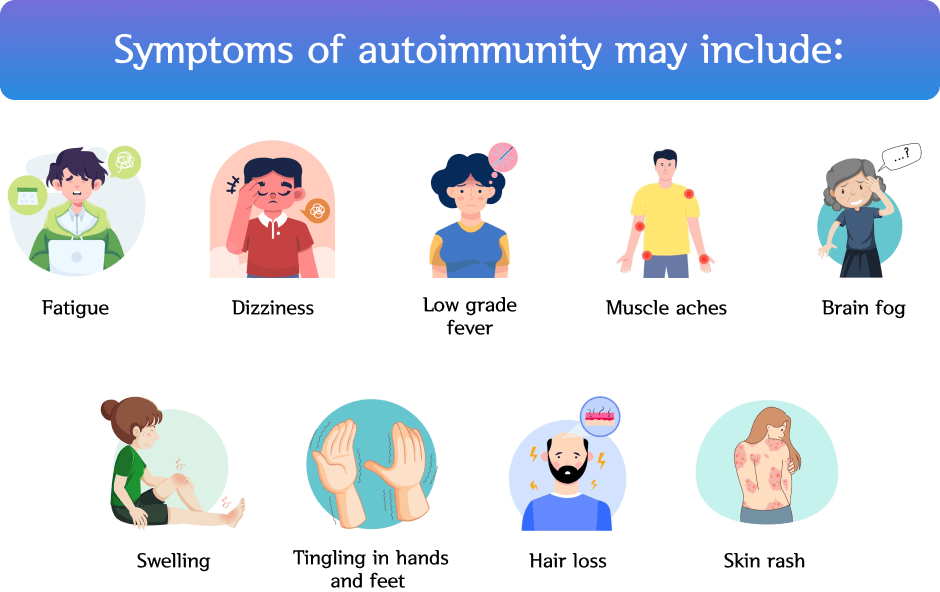
Symptoms of autoimmunity may include:
- Fatigue
- Dizziness
- Low grade fever
- Muscle aches
- Swelling
- Brain fog
- Numbness and tingling in hands and feet
- Hair loss
- Skin rash
Non-Genetic Factors that Contribute to Autoimmune Disease
Many environmental and behavioral factors can play a role in autoimmune disorders. While you cannot control your genetic profile, you can reduce or eliminate non-genetic factors that are harmful to your health.
Contributing non-genetic factors may include:
- Exposure to environmental toxins
- Certain vaccines and medications
- Antibiotic medications
- Imbalanced gut microbiome
- Bacterial and viral infections
- Smoking
- Poor nutrition
- Obesity and sedentary lifestyle
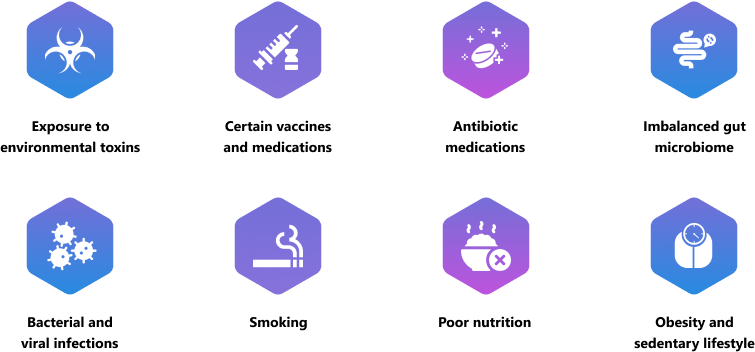
NAD+ IV Therapy for Autoimmune Disease
Your body’s metabolic processes are closely linked to your immune cell function, and disruptions in metabolism due to lifestyle and environmental factors can lead to impaired immune responses.
Nicotinamide adenine dinucleotide (NAD+) is a critical enzyme cofactor used by many enzymes to regulate a broad range of cellular functions, including:
- Energy metabolism
- DNA repair
- Regulation of epigenetic factors
- Regulation of the inflammatory response
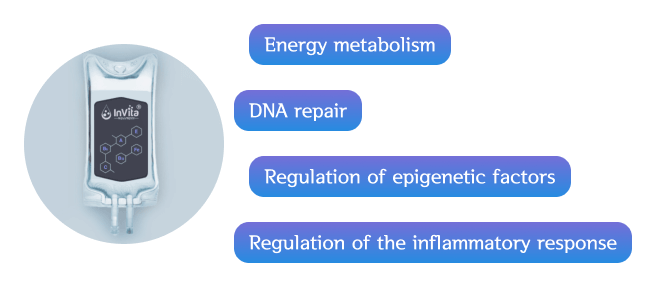
NAD+ IV therapy has been shown to have immune-modulatory properties that keep the immune response in check, reducing your risk of autoimmune disease and mitigating its overall impact on your health. When combined with the adoption of healthy lifestyle practices, NAD+ IV therapy can be a game-changer that helps you enhance vitality and longevity, to improve your overall quality of life.
Get NAD+ IV Therapy for Autoimmune Disease in NYC
NAD+ and its precursors – substances your body uses to make NAD+ – can be taken as oral supplements, but it is impossible to regulate their potency, since the digestive process often dilutes or suppresses their synthesis. NAD+ IV therapy delivers nutrients directly to their bloodstream, keeping their potency intact. Because NAD is a nutrient and not a drug, you don’t need a medical prescription to leverage its benefits.
Get NAD+ IV Therapy for Autoimmune Disease in NYC
contact InVita Wellness today
Book Now
456 Broadway 2 Floor, New York, NY 10013, USA
At Invita Wellness, we provide NAD+ IV therapy for autoimmune disease in our spa-like Manhattan clinic. Our fully licensed and certified clinicians ensure that your IV therapy session is safe and effective. If you are suffering from autoimmune disease and are at a loss for solutions, contact Invita Wellness today and see what a difference NAD+ IV therapy for autoimmune disease can make to your overall health and wellbeing.
Resources
Navarro, Maria N., Manuel M. Gómez de Las Heras, and Maria Mittelbrunn. “Nicotinamide adenine dinucleotide metabolism in the immune response, autoimmunity and inflammageing.” British journal of pharmacology 179.9 (2022): 1839-1856.
https://bpspubs.onlinelibrary.wiley.com/doi/full/10.1111/bph.15477
Pisetsky, David S. “Pathogenesis of autoimmune disease.” Nature Reviews Nephrology 19.8 (2023): 509-524.
https://www.nature.com/articles/s41581-023-00720-1
Zhang, Zhenrui, and Shiv Pillai. “An e-Xist-ential two-edged sword for women.” Science Immunology 9.93 (2024): eado6826.
https://www.science.org/doi/full/10.1126/sciimmunol.ado6826